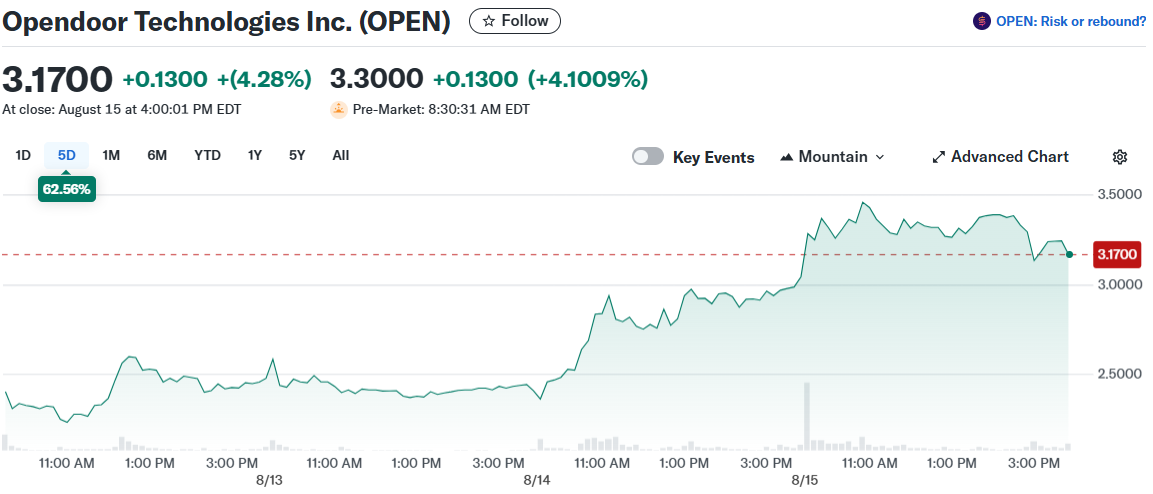TLDR
- Opendoor stock surged 68.7% this week and 245% in Q3 2025, driven by meme stock momentum and 23% short interest
- CEO Carrie Wheeler announced retirement as company searches for new leadership
- Q2 earnings showed $1.6B revenue and first adjusted EBITDA profitability since 2022 at $23M
- Stock met Nasdaq minimum bid requirements, securing listing and removing delisting concerns
- Business fundamentals remain weak with $300M net losses over twelve months and debt-to-equity ratio of 3.46
Opendoor Technologies has become the latest meme stock sensation. The real estate platform’s shares exploded 68.7% this week to close at $3.21 on Friday.

The surge caps a remarkable 245% rally over Q3 2025. Social media endorsements and retail investor campaigns have transformed the struggling iBuyer into a speculative darling.
High short interest of 23% attracted squeeze-hungry traders. Trading volume spiked well above the normal average of 198 million shares as momentum built throughout the week.
The company added fuel to its own fire Friday. Opendoor announced CEO Carrie Wheeler would step down while the board searches for new leadership.
Wheeler’s departure timing raised eyebrows. The announcement came just as meme stock momentum was building around the beaten-down shares.
The leadership change excited investors hoping for a strategic turnaround. Wheeler had led the company through its transition from capital-intensive iBuying to a more flexible agent-led approach.
Opendoor also secured its Nasdaq listing this week. The stock met the exchange’s minimum bid price requirement, removing delisting concerns that had weighed on shares.
The rally pushed shares nearly triple from recent lows around $1. However, they remain down 90% from 2021 highs when SPAC mania drove the stock near $40.
Financial Performance Shows Mixed Signals
Recent earnings provided ammunition for both bulls and bears. Q2 revenue hit $1.6 billion, beating the $1.5 billion consensus estimate.
More importantly, the company achieved its first adjusted EBITDA profitability since 2022. The $23 million positive result came despite a challenging housing market environment.
However, the underlying business still bleeds cash. Net losses totaled $29 million last quarter and $300 million over the past twelve months.
Gross profit margins remain razor-thin at just 8.05%. The company generated only $128 million in gross profit on $1.6 billion in revenue.
Revenue has declined 30.51% over three years. The current $5.15 billion annual run rate sits well below peak levels from the company’s early days.
The balance sheet shows stress with a debt-to-equity ratio of 3.46. A current ratio of 4.4 provides some comfort on short-term liquidity needs.
Home acquisitions dropped 63% year-over-year as the company pivots its strategy. The shift away from capital-intensive iBuying has reduced revenue but improved margins.
Business Model Evolution Continues
Opendoor’s original iBuying model involved purchasing homes, renovating them, and reselling at higher prices. Think home flipping at massive scale with algorithmic pricing.
The model requires enormous amounts of capital to finance home purchases. This creates financing constraints that have limited growth potential throughout the company’s history.
Rising interest rates make the debt financing more expensive. Home price volatility adds risk to profit margins on each transaction.
The company has never generated positive net income since going public. Scaling the business profitably has proven more difficult than early investors anticipated.
Competition from traditional real estate agents and other iBuyers adds pressure. Market share gains have been hard to achieve in the fragmented real estate industry.
Wheeler embraced a strategic pivot toward agent-led models earlier this year. The launch of the Key Agent iOS app and hybrid Cash Plus product signals diversification efforts.
The new approach showed promise with fivefold increases in listing conversions. Customer engagement doubled under the agent-led model compared to traditional iBuying.
UBS maintains a cautious outlook despite the recent rally. Analysts point to structural challenges in both the old and new business models.
Technical analysis shows the stock broke above $3.22 resistance this week. Traders are watching for a pullback to the $3.13 support level as momentum potentially cools.
The current price-to-sales ratio of 0.35 reflects deep market skepticism. Investors continue questioning whether operations can turn consistently profitable under any model.
Recent trading patterns show strong bullish momentum from $2.31 to $3.22. Volume supported the price advance throughout the week as retail interest intensified.
Wheeler will remain as CEO during the transition period while the board conducts its search for a replacement.






